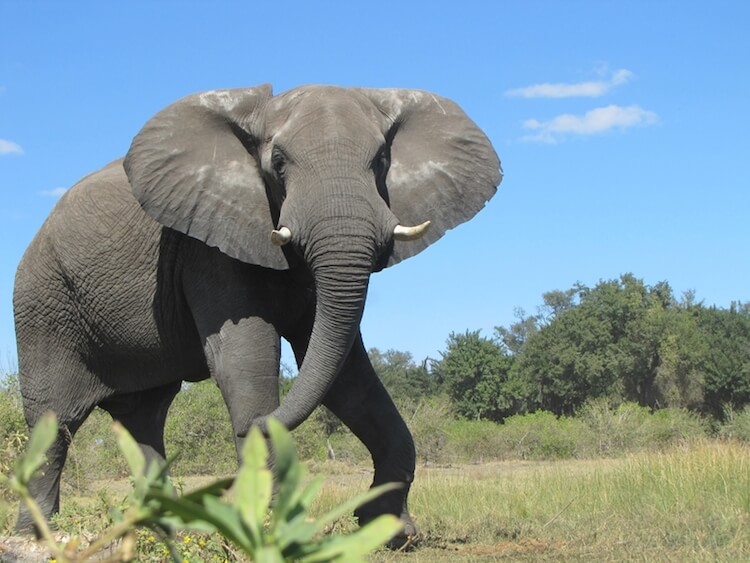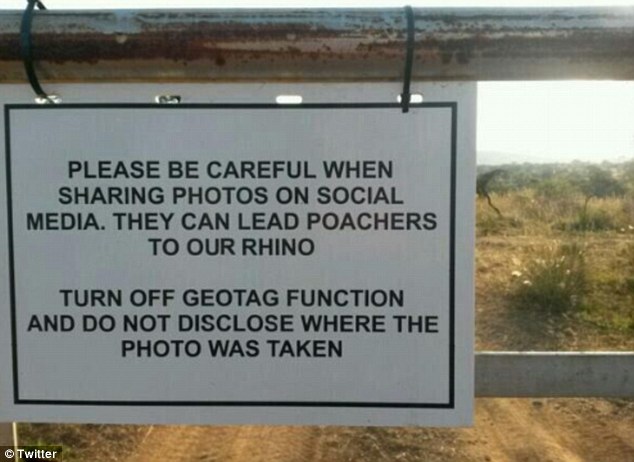Tourists in Africa are unwittingly helping poachers locate elephants, rhinos and lions by posting geo-tagged images of wildlife to social media sties like Facebook and Twitter. This is according to South African National Parks (SanParks) officials, who are urging visitors to exercise extreme caution when sharing wildlife images online.
Turn off the geo-tagging feature when photographing wildlife to avoid helping poachers. © Don Martinson.
Park officials believe that organized poaching gangs are scouring social media sites in search of images posted by tourists on safari. If an image includes geo-tagging data, which indicates when and where the picture was taken, poachers can use the information to swoop in by chopper for a quick kill.
© Twitter.
SanParks spokesman Marc Reading recently told The Daily Mirror , “It is concerning. Unidentified choppers have been finding animals very quickly and we think it’s down to this (social media).”
A poaching crisis has swept across much of sub-Saharan African in recent years as demand for rhino horn, ivory, and other illicit wildlife products has boomed in Asian markets, causing prices to skyrocket. Last year, poachers killed more than 1,000 rhino in South Africa — 700 in Kruger National Park alone.
So does this mean that you should never share your prized safari photos on social media? Not exactly. But you should definitely make sure the geo-tagging feature on your smartphone or camera is turned off, especially if you are photographing rhinos, elephants, and other species targeted by poachers.
Request Your 2025/2026 Catalog
Discover the World's Best
Nature Travel Experiences
Together, Natural Habitat Adventures and World Wildlife Fund have teamed up to arrange nearly 100 nature travel experiences around the planet, while helping to protect the magnificent places we visit and their wild inhabitants.
Discover the World's Best
Nature Travel Experiences
Our weekly eNewsletter highlights new adventures, exclusive offers, webinars, nature news, travel ideas, photography tips and more. Sign up today!
Hidden form View
Home Trips Trips Catalog Catalog
Book
Contact Contact More More Have a question or comment? Hours Mountain Time
×
Home
Trips
Trips
Catalog
Catalog
Book
Contact
Contact
More
More
[ebook-modal-wrapper]
[ebook-modal-wrapper]
[full-width-start]
[full-width-start]
[full-width-end]
[full-width-end]
[aside-height-start]
[aside-height-start]
[aside-height-end form-start]
[aside-height-end form-start]
[aside-content-start aside-text-start]
[aside-content-start aside-text-start]
[aside-text-end]
[aside-text-end]
[aside-image-start]
[aside-image-start]
[aside-image-end aside-content-end]
[aside-image-end aside-content-end]
[content-start subheader-start]
[content-start subheader-start]
[subheader-end main-header-start]
[subheader-end main-header-start]
[main-header-end image-height-start]
[main-header-end image-height-start]
[image-height-end content-end]
[image-height-end content-end]
[ebook-header-optin]
[ebook-header-optin]
[ebook-subheader-optin]
[ebook-subheader-optin]
[ebook-aside-image]
[ebook-aside-image]
[ebook-aside-text]
[ebook-aside-text]
[ebook-logos]
[ebook-logos]
[form-header-start]
[form-header-start]
[form-header-end form-start]
[form-header-end form-start]
[ebook-header-form]
[ebook-header-form]
[privacy-policy]
[privacy-policy]
[ebook-form-sms-text-wrapper]
[ebook-form-sms-text-wrapper]
[ebook-sms-privacy-wrapper]
[ebook-sms-privacy-wrapper]
[ebook-sms-fine-print]
[ebook-sms-fine-print]
[ebook-submit-button]
[ebook-submit-button]
[ebook-header-success]
[ebook-header-success]
[ebook-success-text]
[ebook-success-text]
[thank-you-start]
[thank-you-start]
[thank-you-end link-text-start]
[thank-you-end link-text-start]
[link-text-end]
[link-text-end]
[aside-start]
[aside-start]
[aside-end form-start]
[aside-end form-start]
[content-start]
[content-start]
[content-end]
[content-end]
[aside-content-start aside-image-start]
[aside-content-start aside-image-start]
[aside-image-end]
[aside-image-end]
[aside-text-start logos-start]
[aside-text-start logos-start]
[aside-text-end logos-end aside-content-end]
[aside-text-end logos-end aside-content-end]
[subheader-start]
[subheader-start]
[main-header-end aside-image-start aside-text-start]
[main-header-end aside-image-start aside-text-start]
[aside-text-end logos-start]
[aside-text-end logos-start]
[aside-image-end logos-end]
[aside-image-end logos-end]
[ebook-modal-wrapper]
[ebook-modal-wrapper]
[full-width-start]
[full-width-start]
[full-width-end]
[full-width-end]
[aside-height-start]
[aside-height-start]
[aside-height-end form-start]
[aside-height-end form-start]
[aside-content-start aside-text-start]
[aside-content-start aside-text-start]
[aside-text-end]
[aside-text-end]
[aside-image-start]
[aside-image-start]
[aside-image-end aside-content-end]
[aside-image-end aside-content-end]
[content-start subheader-start]
[content-start subheader-start]
[subheader-end main-header-start]
[subheader-end main-header-start]
[main-header-end image-height-start]
[main-header-end image-height-start]
[image-height-end content-end]
[image-height-end content-end]
[ebook-header-optin]
[ebook-header-optin]
[ebook-subheader-optin]
[ebook-subheader-optin]
[ebook-aside-image]
[ebook-aside-image]
[ebook-aside-text]
[ebook-aside-text]
[ebook-logos]
[ebook-logos]
[form-header-start]
[form-header-start]
[form-header-end form-start]
[form-header-end form-start]
[ebook-header-form]
[ebook-header-form]
[privacy-policy]
[privacy-policy]
[ebook-form-sms-text-wrapper]
[ebook-form-sms-text-wrapper]
[ebook-sms-privacy-wrapper]
[ebook-sms-privacy-wrapper]
[ebook-sms-fine-print]
[ebook-sms-fine-print]
[ebook-submit-button]
[ebook-submit-button]
[ebook-header-success]
[ebook-header-success]
[ebook-success-text]
[ebook-success-text]
[thank-you-start]
[thank-you-start]
[thank-you-end link-text-start]
[thank-you-end link-text-start]
[link-text-end]
[link-text-end]
[aside-start]
[aside-start]
[aside-end form-start]
[aside-end form-start]
[content-start]
[content-start]
[content-end]
[content-end]
[aside-content-start aside-image-start]
[aside-content-start aside-image-start]
[aside-image-end]
[aside-image-end]
[aside-text-start logos-start]
[aside-text-start logos-start]
[aside-text-end logos-end aside-content-end]
[aside-text-end logos-end aside-content-end]
[subheader-start]
[subheader-start]
[main-header-end aside-image-start aside-text-start]
[main-header-end aside-image-start aside-text-start]
[aside-text-end logos-start]
[aside-text-end logos-start]
[aside-image-end logos-end]
[aside-image-end logos-end]
[ebook-modal-wrapper]
[ebook-modal-wrapper]
[ebook-background-image]
[ebook-background-image]
[ebook-header-optin]
[ebook-header-optin]
[ebook-subheader-optin]
[ebook-subheader-optin]
[privacy-policy]
[privacy-policy]
[ebook-form-sms-text-wrapper]
[ebook-form-sms-text-wrapper]
[ebook-sms-privacy-wrapper]
[ebook-sms-privacy-wrapper]
[ebook-sms-fine-print]
[ebook-sms-fine-print]
[ebook-submit-button]
[ebook-submit-button]
[ebook-header-success]
[ebook-header-success]
[ebook-success-text]
[ebook-success-text]
[full-width-start]
[full-width-start]
[full-width-end]
[full-width-end]
[image-height-start]
[image-height-start]
[image-height-end content-start]
[image-height-end content-start]
[content-end]
[content-end]
[content-start subheader-start]
[content-start subheader-start]
[subheader-end main-header-start]
[subheader-end main-header-start]
[main-header-end form-start]
[main-header-end form-start]
[form-end content-end]
[form-end content-end]
[full-width-start logos-start]
[full-width-start logos-start]
[image-height-start logos-start]
[image-height-start logos-start]
[logos-start]
[logos-start]
[logos-end content-start]
[logos-end content-start]
[full-height-start]
[full-height-start]
[logos-start content-start]
[logos-start content-start]
[logos-end content-end full-height-end]
[logos-end content-end full-height-end]
[main-header-start]
[main-header-start]
[main-header-end subheader-start]
[main-header-end subheader-start]
[subheader-end form-start]
[subheader-end form-start]
[thank-you-start]
[thank-you-start]
[thank-you-end link-text-start]
[thank-you-end link-text-start]
[link-text-end]
[link-text-end]
[ebook-modal-wrapper]
[ebook-modal-wrapper]
[ebook-background-image]
[ebook-background-image]
[ebook-header-optin]
[ebook-header-optin]
[ebook-subheader-optin]
[ebook-subheader-optin]
[privacy-policy]
[privacy-policy]
[ebook-form-sms-text-wrapper]
[ebook-form-sms-text-wrapper]
[ebook-sms-privacy-wrapper]
[ebook-sms-privacy-wrapper]
[ebook-sms-fine-print]
[ebook-sms-fine-print]
[ebook-submit-button]
[ebook-submit-button]
[ebook-header-success]
[ebook-header-success]
[ebook-success-text]
[ebook-success-text]
[full-width-start]
[full-width-start]
[full-width-end]
[full-width-end]
[image-height-start]
[image-height-start]
[image-height-end content-start]
[image-height-end content-start]
[content-end]
[content-end]
[content-start subheader-start]
[content-start subheader-start]
[subheader-end main-header-start]
[subheader-end main-header-start]
[main-header-end form-start]
[main-header-end form-start]
[form-end content-end]
[form-end content-end]
[full-width-start logos-start]
[full-width-start logos-start]
[image-height-start logos-start]
[image-height-start logos-start]
[logos-start]
[logos-start]
[logos-end content-start]
[logos-end content-start]
[full-height-start]
[full-height-start]
[logos-start content-start]
[logos-start content-start]
[logos-end content-end full-height-end]
[logos-end content-end full-height-end]
[main-header-start]
[main-header-start]
[main-header-end subheader-start]
[main-header-end subheader-start]
[subheader-end form-start]
[subheader-end form-start]
[thank-you-start]
[thank-you-start]
[thank-you-end link-text-start]
[thank-you-end link-text-start]
[link-text-end]
[link-text-end]
[ebook-modal-wrapper]
[ebook-modal-wrapper]
[ebook-background-image]
[ebook-background-image]
[ebook-header-optin]
[ebook-header-optin]
[ebook-subheader-optin]
[ebook-subheader-optin]
[privacy-policy]
[privacy-policy]
[ebook-form-sms-text-wrapper]
[ebook-form-sms-text-wrapper]
[ebook-sms-privacy-wrapper]
[ebook-sms-privacy-wrapper]
[ebook-sms-fine-print]
[ebook-sms-fine-print]
[ebook-submit-button]
[ebook-submit-button]
[ebook-header-success]
[ebook-header-success]
[ebook-success-text]
[ebook-success-text]
[full-width-start]
[full-width-start]
[full-width-end]
[full-width-end]
[image-height-start]
[image-height-start]
[image-height-end content-start]
[image-height-end content-start]
[content-end]
[content-end]
[content-start subheader-start]
[content-start subheader-start]
[subheader-end main-header-start]
[subheader-end main-header-start]
[main-header-end form-start]
[main-header-end form-start]
[form-end content-end]
[form-end content-end]
[full-width-start logos-start]
[full-width-start logos-start]
[image-height-start logos-start]
[image-height-start logos-start]
[logos-start]
[logos-start]
[logos-end content-start]
[logos-end content-start]
[full-height-start]
[full-height-start]
[logos-start content-start]
[logos-start content-start]
[logos-end content-end full-height-end]
[logos-end content-end full-height-end]
[main-header-start]
[main-header-start]
[main-header-end subheader-start]
[main-header-end subheader-start]
[subheader-end form-start]
[subheader-end form-start]
[thank-you-start]
[thank-you-start]
[thank-you-end link-text-start]
[thank-you-end link-text-start]
[link-text-end]
[link-text-end]
[ebook-modal-wrapper]
[ebook-modal-wrapper]
[ebook-background-image]
[ebook-background-image]
[ebook-header-optin]
[ebook-header-optin]
[ebook-subheader-optin]
[ebook-subheader-optin]
[privacy-policy]
[privacy-policy]
[ebook-form-sms-text-wrapper]
[ebook-form-sms-text-wrapper]
[ebook-sms-privacy-wrapper]
[ebook-sms-privacy-wrapper]
[ebook-sms-fine-print]
[ebook-sms-fine-print]
[ebook-submit-button]
[ebook-submit-button]
[content-start main-header-start]
[content-start main-header-start]
[main-header-end subheader-start]
[main-header-end subheader-start]
[subheader-end content-end]
[subheader-end content-end]
[ebook-header-success]
[ebook-header-success]
[ebook-success-text]
[ebook-success-text]
[full-width-start]
[full-width-start]
[full-width-end]
[full-width-end]
[image-height-start]
[image-height-start]
[image-height-end content-start]
[image-height-end content-start]
[content-end]
[content-end]
[content-start subheader-start]
[content-start subheader-start]
[subheader-end main-header-start]
[subheader-end main-header-start]
[main-header-end form-start]
[main-header-end form-start]
[form-end content-end]
[form-end content-end]
[full-width-start logos-start]
[full-width-start logos-start]
[image-height-start logos-start]
[image-height-start logos-start]
[logos-start]
[logos-start]
[logos-end content-start]
[logos-end content-start]
[full-height-start]
[full-height-start]
[logos-start content-start]
[logos-start content-start]
[logos-end content-end full-height-end]
[logos-end content-end full-height-end]
[main-header-start]
[main-header-start]
[subheader-end form-start]
[subheader-end form-start]
[thank-you-start]
[thank-you-start]
[thank-you-end link-text-start]
[thank-you-end link-text-start]
[link-text-end]
[link-text-end]
[ebook-modal-wrapper]
[ebook-modal-wrapper]
[ebook-background-image]
[ebook-background-image]
[ebook-header-optin]
[ebook-header-optin]
[ebook-subheader-optin]
[ebook-subheader-optin]
[privacy-policy]
[privacy-policy]
[ebook-form-sms-text-wrapper]
[ebook-form-sms-text-wrapper]
[ebook-sms-privacy-wrapper]
[ebook-sms-privacy-wrapper]
[ebook-sms-fine-print]
[ebook-sms-fine-print]
[ebook-submit-button]
[ebook-submit-button]
[ebook-header-success]
[ebook-header-success]
[ebook-success-text]
[ebook-success-text]
[full-width-start]
[full-width-start]
[full-width-end]
[full-width-end]
[image-height-start]
[image-height-start]
[image-height-end content-start]
[image-height-end content-start]
[content-end]
[content-end]
[content-start subheader-start]
[content-start subheader-start]
[subheader-end main-header-start]
[subheader-end main-header-start]
[main-header-end form-start]
[main-header-end form-start]
[form-end content-end]
[form-end content-end]
[full-width-start logos-start]
[full-width-start logos-start]
[image-height-start logos-start]
[image-height-start logos-start]
[logos-start]
[logos-start]
[logos-end content-start]
[logos-end content-start]
[full-height-start]
[full-height-start]
[logos-start content-start]
[logos-start content-start]
[logos-end content-end full-height-end]
[logos-end content-end full-height-end]
[main-header-start]
[main-header-start]
[main-header-end subheader-start]
[main-header-end subheader-start]
[subheader-end form-start]
[subheader-end form-start]
[thank-you-start]
[thank-you-start]
[thank-you-end link-text-start]
[thank-you-end link-text-start]
[link-text-end]
[link-text-end]





























